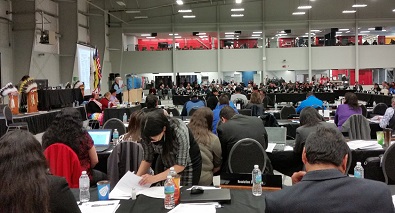The FSIN’s name change grabbed a lot of people’s attention on the first day of its spring Legislative Assembly, but there were numerous other motions on the table for Saskatchewan’s chiefs to consider.
A long list of amendments to FSIN’s Election Act was one of the most controversial topics at the North Battleford gathering on Wednesday. One amendment proposed changing the bond to run for office with FSIN from $1,000 to $3,000.
Saskatoon Tribal Council Chief Felix Thomas said he knew that the previous bond amount existed to deter frivolous candidates from entering the race, but now it seems the jump is going towards offsetting the costs of the election assembly.
Lac la Ronge Chief Tammy Cook-Searson said she believes the three-fold increase to $3,000 is too much, and wants to keep the bond at $1,000.
Others suggested the amendments were being rushed, and said it’s important the people involved in drafting those changes are impartial.
The motions to carry those amendments were rescinded, and it will be brought back in July.
Much of the FSIN’s agenda on Wednesday centred on making changes that reflect its role in the new national political landscape. This included motions to create Treaty Implementation Cards to replace Treaty Status Cards and motions to discuss the re-establishment of nation-to-nation relationships with Canada.
On the first day, chiefs heard about a big investment in Indigenous job training and opportunities from the Liberal Minister of Employment, MaryAnn Mihychuk.
FSIN Chief Bobby Cameron says having a new government that’s receptive to change, means now is the time for FSIN to act.
“Now is the time, now is the opportunity to really assert our jurisdiction and sovereignty as treaty people,” he said.
He reiterated that when speaking to the hundred or so chiefs, delegates and observers on Wednesday, saying FSIN needs to seize the opportunity to make their legislative changes count because “we know they wouldn’t happen under the Conservatives.”
But there’s been some ground-level dispute over FSIN’s role when it comes to implementing treaties, led by Sakimay Chief Lynn Acoose. Acoose repeated numerous times throughout Wednesday that it’s not FSIN’s role to enact treaty implementation, and asked FSIN to refrain from claiming that it is.
“Our people on the ground do that,” she said. “Our people are the ones who have that power.”
That will likely come up again on Thursday, as well there will be speeches from two more federal ministers at the North Battleford assembly.
